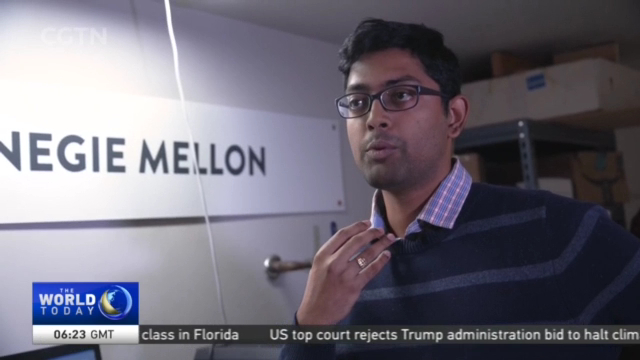
15:07, 03-Nov-2018
Future of Jobs: Technology reshapes labor market
Updated
15:01, 06-Nov-2018
03:21

Transitions in economies for the future. Robot technology is reshaping the labor market in Pittsburgh, a city with a deep industrial past. CGTN's Nathan King shows us.
One's a spider. One's a snake. These look like cool toys, but they're cutting edge robot technology-the brainchild's of these students at the world famous Carnegie Institute of Robotics in Pittsburgh.
Nathan "So what's this?"
LU LI, PROJECT SCIENTIST CARNEGIE MELLON UNIVERSITY "So this is our snake Robot for search and rescue or industrial automation application- So each of these snakes have 16 identical modules which can perform locomotion in rugged terrain such as disaster site or industrial pipeline site."
This snake robot has already saved lives in Mexico City's earthquake last year and will continue to save lives in the future.
NATHAN KING PITTSBURGH "One of the applications of a snake robot - it doesn't have to be that big - is a robot that's like a snake that goes into the body to do surgery."
Student Arun Srivatsan describes how this robot could remove a tumor from your throat.
ARUN SRIVATSAN, POSTDOCTORAL RESEARCHER CARNEGIE MELLON UNIVERSITY "Typically the way people would do that would be to crack open your jaw, remove it and put it back together- so you can imagine how long it would take them to recuperate. But with this robot, you can get the robot in the back of your mouth, take a few turns, reach the back of the throat, remove the tumor and out you are."
From tiny robots that help kill cancer to big industrial robots that can sniff out radioactive material.
NATHAN KING PITTSBURGH "So, there she goes! This is the RAD Piper robot developed here. Essentially, what it's going to do is go down this pipe and it can detect how much uranium is there. Now why is this important. Well, you'd rather a robot go down in a pipe that a human being - think of all those old nuclear power plants where you have to get out all this industrial nuclear waste."
ZHAO DAPENG, RESEARCH ASSOCIATE CARNEGIE MELLON UNIVERSITY "So, if the robot doesn't do it, then, we have to send actual human beings, human workers to do this job. It is very harmful for their bodies, for their health. It's also a very time-consuming and very intensive work for them to do, and very costly, too."
One thing that hits you at the robotics institute is the sheer number of foreign students working on these industries of tomorrow, particularly Chinese scientists. In fact, Carnegie Mellon tells us that nearly a third of the graduate students at the university are from China.
And while creating the technology and intellectual property of the future here is a truly globalized process, getting a visa to stay in the U.S. is getting much harder. And, the students and staff here are pretty candid about their problems.
ZHAO DAPENG, RESEARCH ASSOCIATE CARNEGIE MELLON UNIVERSITY "Yeah, that took some hustle to make it happen and enable me to be here and actually work. It's quite a process and can be done."
SHI HAOWEN, UNDERGRADUATE CARNEGIE MELLON UNIVERSITY "It's definitely a sad thing because technology should not have borders. It is very international here, and everybody is working towards the same goal."
Robots know no nationality, but those who build them do. And that could slow down the industries and technologies of the future. NATHAN KING, CGTN, PITTSBURGH.

SITEMAP
Copyright © 2018 CGTN. Beijing ICP prepared NO.16065310-3
Copyright © 2018 CGTN. Beijing ICP prepared NO.16065310-3